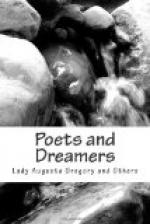’No flower in
any garden, and the leaves of the trees have leave
to
cry, and they falling
on the ground. There is no green flower on
the tops of the tufts,
since there did a boarded coffin go on Daly.
’There is sorrow on the men of mirth, a clouding over the day, and no trout swim in the river. Orpheus on the harp, he lifted up everyone out of their habits; and he that stole what Argus was watching the time he took away Io; Apollo, as we read, gave them teaching, and Daly was better than all these musicians.
’A hundred wouldn’t
be able to put together his actions and his
deeds and his many good
works. And Raftery says this much for Daly,
because he liked him.’
Though his praises are usually all for the poor, for the people, he has left one beautiful lament for a landowner:—
’There’s no dew or grass on Cluan Leathan. The cuckoo is not to be seen on the furze; the leaves are withering and the trees complaining of the cold. There is no sun or moon in the air or in the sky, or no light in the stars coming down, with the stretching of O’Kelly in the grave.
’My grief to tell
it! he to be laid low; the man that did not bring
grief or trouble on
any heart, that would give help to those that
were down.
’No light on the day like there was; the fruits not growing; no children on the breast; there’s no return in the grain; the plants don’t blossom as they used since O’Kelly with the fair hair went away; he that used to forgive us a great share of the rent.
’Since the children of Usnach and Deirdre went to the grave and Cuchulain, who, as the stories tell us, would gain victory in every step he would take; since he died, such a story never came of sorrow or defeat; since the Gael were sold at Aughrim, and since Owen Roe died, the Branch.’
V.
His life was always the wandering, homeless life of the old bards. After Cromwell’s time, as the houses they went to grew poorer, they had added music to their verse-making; and Raftery’s little fiddle helped to make him welcome in the Ireland which was, in spite of many sorrows, as merry and light-hearted up to the time of the great famine as England had been up to the time of the Puritans. ‘He had no place of his own,’ I am told, ’but to be walking the country. He did well to die before the bad years came. He used to play at Kiltartan cross for the dancing of a Sunday evening. And when he’d come to any place, the people would gather and he’d give them a dance; for there was three times as many people in the world then as what there is now. The people would never have let him want; but as to money, what could he do with it, and he with no place of his own?’ An old woman near Craughwell says: ’He used to come here often; it was like home to him. He




